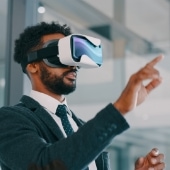 Virtual reality (VR) is often thought of as a gaming technology. However, VR can do much more than provide entertainment. For instance, it has the potential to revolutionize the way businesses operate and interact with their customers. In this blog post, we will discuss the reasons why VR is a worthwhile investment and how it can help your business grow.
Virtual reality (VR) is often thought of as a gaming technology. However, VR can do much more than provide entertainment. For instance, it has the potential to revolutionize the way businesses operate and interact with their customers. In this blog post, we will discuss the reasons why VR is a worthwhile investment and how it can help your business grow.
Take customers on an adventure
If you are a travel- or adventure-based business, you can use VR to give customers a taste of what to expect from your attractions. For example, if you’re running an amusement park, you can feature a VR simulation of one of your most popular rides. Or if you own a resort or campground, you can create a virtual tour of your rooms as well as VR simulations of the activities you have in store for visitors.
VR training
As a training tool, VR has been proven to be much more effective than in-classroom or e-learning methods. According to a 2020 PwC study, VR learners are:
- Four times more focused than their e-learning counterparts
- Four times faster to train than their in-classroom counterparts
- Nearly four times more emotionally connected to what they are learning than classroom learners
- 275% more confident to apply the skills they’ve learned from the training
This means that VR learners are highly likely to become more productive and efficient sooner than non-VR learners.
Another important advantage of VR training is that it can safely replicate situations that are dangerous or have adverse consequences if people make wrong or suboptimal choices in real life. Here are a few examples:
- Pilots log many hours in VR training long before they actually get off the ground.
- With haptic VR, budding surgeons can learn to use scalpels and other tools without cutting into actual flesh.
- Trainees in organizational leadership can also learn soft skills via VR training. Immersive VR interactions provide impactful learning experiences with little to no risk of unwanted real-world consequences such as fallouts with colleagues.
Create your own VR prototypes
Thanks to VR, you won’t have to rely solely on manufacturing prototypes when you want to see what your product physically looks like and how it might work. Also, VR prototypes allow you to make any changes before actual production. Model creation in VR, in particular, lets you save company resources, as it enables manufacturers to make changes to a product without the time and money required to build a physical model.
And if you have the data, you can use VR to simulate real-world conditions. To illustrate, you can see how your automotive suspension design responds to different types of terrain, or how easily your drone can be controlled in a hurricane.
VR for engineers
As with manufacturing, using VR is time- and cost-efficient for engineers, architects, and other professionals who work in large-scale construction. It replaces traditional approaches, such as rendering small 2D models, and offers a more immersive experience that helps in designing structures that are more useful and intuitive for the people who’ll be using them.
VR real estate tours
With VR, real estate agents don’t have to tour potential buyers in the actual property. They can let their clients see what the property looks like in a 3D setting and virtually go from room to room. Brokers can entertain buyers who may be miles away or simply don’t want to spend time and additional resources going from house to house.
All businesses stand to benefit from technological advancements. However, determining what to adopt might be difficult when there are so many options available. Don’t hesitate to contact us if you have any questions about how VR can be integrated into your business.



